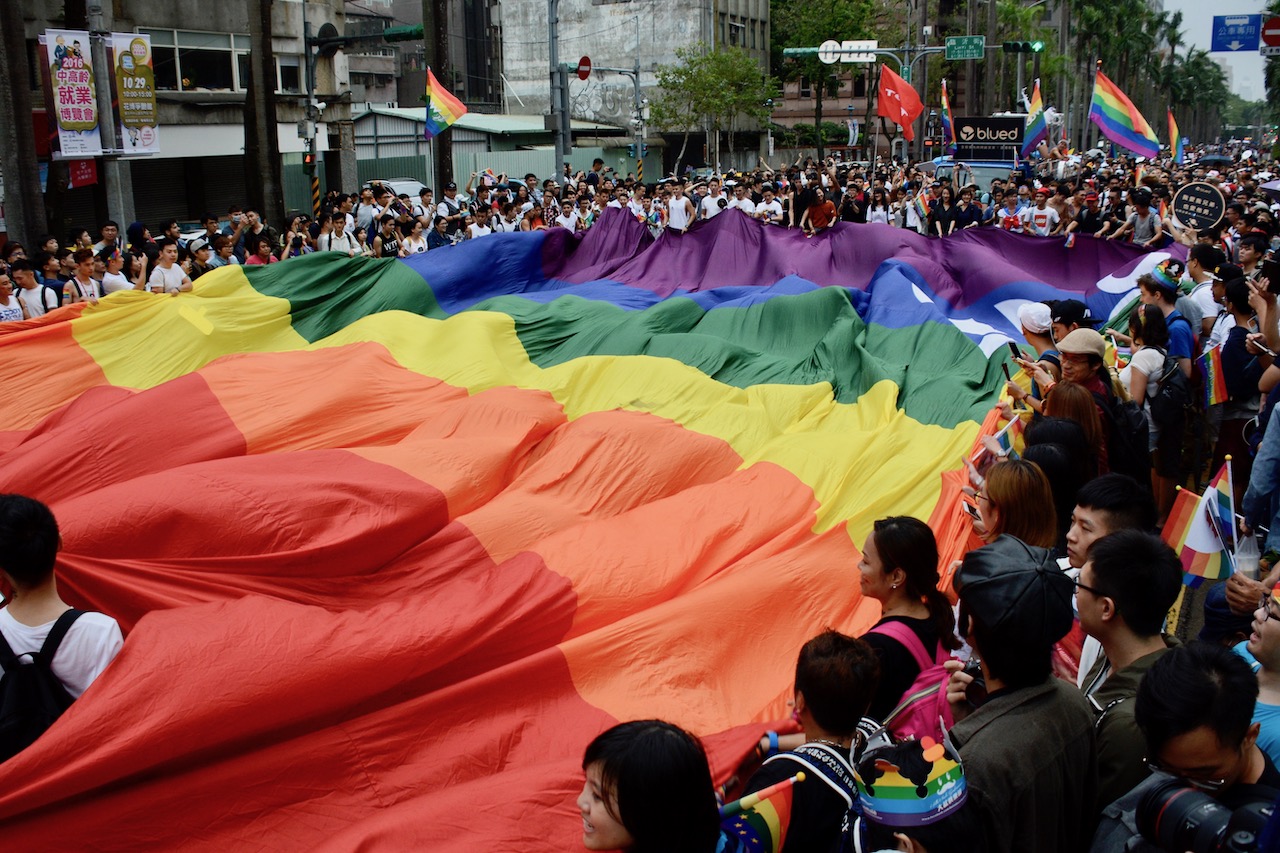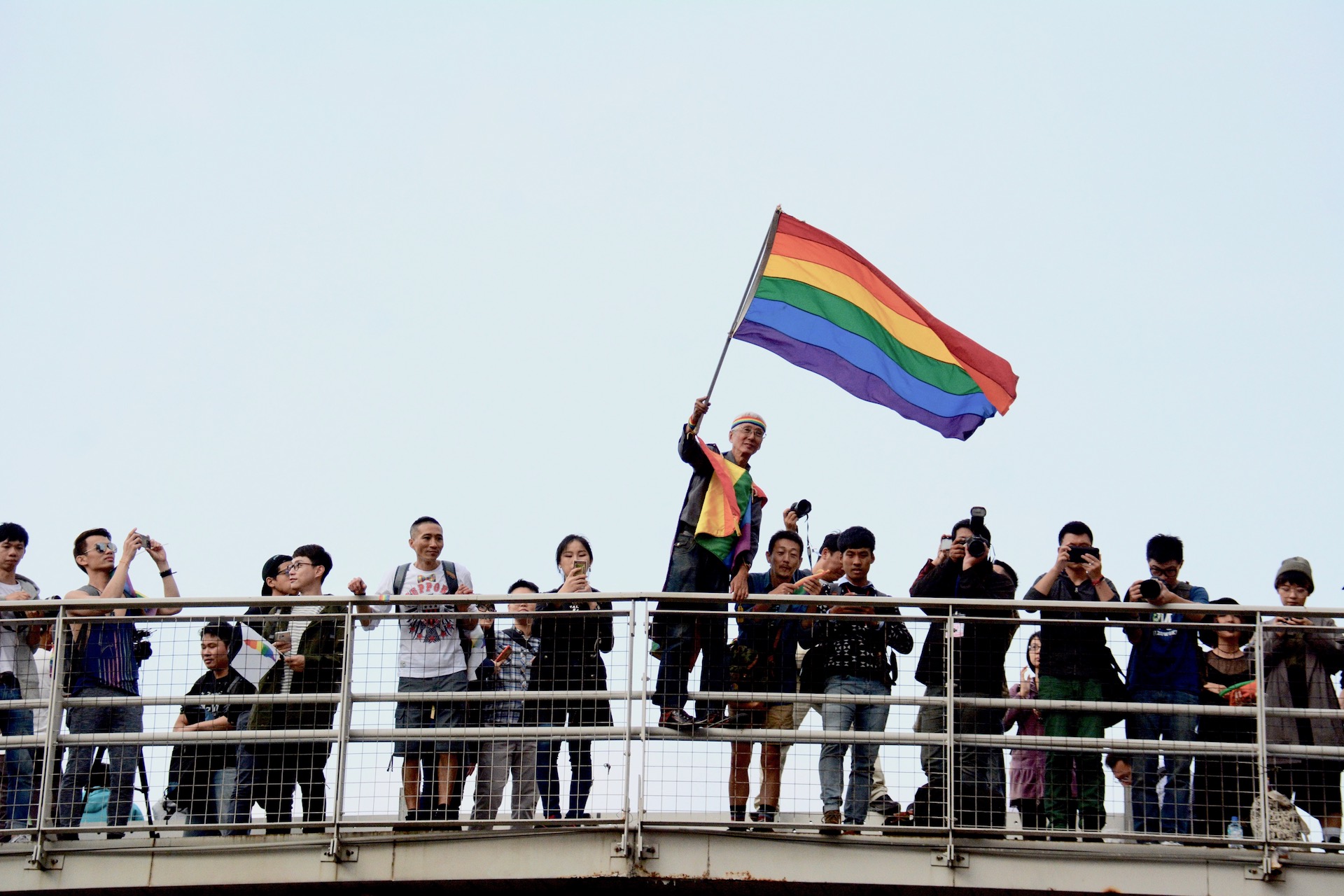Progressive views on LGBT rights and ongoing efforts to legalize same-sex marriage are generating tremendous soft power for Taiwan. Moreover, international coverage of those achievements is refreshingly not overshadowed by the ‘China factor.’
Taiwan is the beacon of LGBT rights in Asia. It hosts the largest pride parade in the region, has fewer institutional discrimination against the LGBT community, and offers sophisticated education on gender equality and sexuality. Furthermore, Taiwan is on its way to legalizing same-sex marriage. With an ongoing marriage equality campaign that kicked off in the early 2010s and a historic ruling by the Constitutional Court last year, it seems that although the relevant legislative amendment has been set aside due to counter movements and concerns for the upcoming municipal elections, sooner or later Taiwan will be the first country in East Asia to legalize same-sex marriage.
However, beyond its borders, what has the Taiwanese marriage equality movement accomplished? In this study of how mass media have portrayed Taiwan, I argue that the marriage equality movement isn’t merely a domestic affair, but has simultaneously promoted the image of Taiwan in the international community — and for once, without the shadow of China.
This study focuses on the media exposure of the Constitutional Court ruling on May 24, 2017. I was inspired by a Facebook post written by Fan Chi-fei, a Taiwanese journalist stationed in the U.S. for two decades. In it, Fan compares the ruling with the rejection of Taiwan’s application for observer status at the World Health Assembly (WHA) in Geneva, both of which took place the same week. Fan points out that, “Less than ten hours after the ruling was announced, I searched for the keywords ‘Taiwan/same-sex marriage’ on the Internet, and there were already about 10 million results; what’s more, the number was still increasing … but searching for ‘Taiwan/ WHA’ showed only roughly half a million results.” Fan argues that the volume of search results not only demonstrates that marriage equality has generated more attention than the WHA as an international issue, but that a million web pages about Taiwan’s progress in human rights builds up a strong image for Taiwan in its pursuit of liberty, equality and diversity through democracy.
“Less than ten hours after the ruling was announced, I searched for the keywords ‘Taiwan/same-sex marriage’ on the Internet, and there were already about 10 million results.”
As to the WHA incident, the Taiwanese government emphasized the dangers of isolating Taiwan from the global public health system and stressed how advanced Taiwan’s medical field has become. Besides official channels to get support from other countries, Taiwanese representatives abroad submitted articles to local newspapers to gain support from international society. Twitter was also employed to raise awareness. Despite these efforts, Taiwan failed to obtain observer status at the WHA assembly due to interference by China.
Two days later, the long-anticipated result of the Constitutional Court ruling on same-sex marriage was announced; but in contrast with the WHA incident, both the Ministry of Foreign Affairs and representative offices abroad remained largely silent. To have a more accurate sense of this quantitative comparison, I refer to a report generated using Google Trends which shows that, during the week of May 21-27, the hit count for searches using “same-sex marriage”-related keywords was far greater than for those using “WHA”-related phrases, with a strong correlation between “Taiwan” and “same-sex marriage.” Therefore, it is evident that Taiwan received more attention for the ruling than for its WHA bid, which implies that same-sex marriage did bring Taiwan into the spotlight to an extent that the WHA effort never did.

How to make use of this attention, however, is another matter.
With the huge amount of google searches and news coverage, what is the actual content of the news? I delve into the articles in two dimensions: (1) how they describe the ruling; and (2) whether and how they mentioned China. Eleven articles are examined, including BBC[1] [2], CNN, Reuters, Fox News, the Wall Street Journal, the Telegraph, the Guardian and the New York Times, all published on May 24, 2017. This research cannot fully provide the whole picture of how Taiwan was portrayed in the news, nor can it provide clear evidence of how powerful an impact the ruling had on expanding Taiwan’s international space, However, through these articles from major English-language media outlets, we can get a sense of what the world may have learned about Taiwan.
The article by Fox News states that the ruling makes Taiwan “one of the continent’s most liberal democracies” and points out that the lobby for LGBT rights has been effective. The Telegraph piece suggests that Taiwan is to become the first “country” in Asia to legalize same-sex marriage, adding that the ruling “sets Taiwan apart from the rest of Asia.” The Guardian’s subhead reads, “Landmark ruling will mean country is first in Asia to allow gay couples to marry and cements reputation as beacon of liberalism.” In an editorial, the Guardian observes that “The decision highlights Taiwan’s claim to be a beacon of progressive values.” The Wall Street Journal describes the ruling with “The effort gained pace in recent years as Taiwan emerged as a beacon for gay-rights supporters in Asia” and also mentioned that “Taiwan’s greater tolerance for sexual minorities is unusual within Asia.” One of the three articles by the BBC said that Taiwan “is known for its liberal values and holds the biggest annual gay pride event in the region.” The Reuters piece wrote that “Taiwan has a reputation as a beacon of liberalism in the region” and “[Taiwan] showcases the vibrancy of its lesbian, gay, bisexual and transgender community.” Among the 11 articles, five make clear comparisons between Taiwan and other Asian countries which persecute the LGBT community. The Guardian editorial indicates that Taiwan’s achievements in a global context are a reminder of the quick and dramatic change of social attitudes toward LGBT rights; articles by Fox News, CNN and the Wall Street Journal all mention cases of human rights abuses in South Korea or Indonesia, which again reinforce the uniqueness of Taiwan.
Whenever Taiwan is mentioned in the news, it is usually about China or cross-Strait tensions. For instance, when searching “Taiwan” on the BBC website, the first and the second results are “China warns Western firms over Taiwan” and “Taiwan: How China is poaching the island’s diplomatic allies.” However, in the case of same-sex marriage, is there a “China factor” in the news coverage? Based on my research, of the 11 articles, only four mentioned “China.” The ruling on same-sex marriage is therefore a field that has not been overshadowed by China — at least not to the same extent as other issues have. In the BBC article that mentioned China, it only states that “Self-ruled Taiwan, over which China claims sovereignty, is known for its liberal values and holds the biggest annual gay pride event in the region”; in the Reuters piece, China is mentioned in the line “Taiwan, which China regards as a renegade province, has a celebrated annual gay pride parade that showcases the vibrancy of its lesbian, gay, bisexual and transgender community.” The Wall Street Journal states that Taiwan’s historic moment was popular on Chinese social media, Weibo, and neither same-sex marriage nor partnership were recognized in “mainland China,” which gives readers a sense that Taiwan is different from China. In CNN’s piece, China is mentioned in the context of comparing Taiwan with other Asian countries, writing that “[in China] activists and experts say that prejudice and discrimination persist.” Hence, according to how Taiwan is depicted as a polity with a distinct characteristic and independent identity in the case of marriage equality, China is not an important element, though it has been mentioned. Taiwan is described as a liberal and democratic country that makes it stand out from the cross-Strait political dilemma, instead of being a “troublemaker.”
“The effort gained pace in recent years as Taiwan emerged as a beacon for gay-rights supporters in Asia […] Taiwan’s greater tolerance for sexual minorities is unusual within Asia.”
Additionally, due to the continued momentum of the transnational legalization of same-sex marriage, Taiwan will keep appearing in international media as an icon in Asia. On Dec. 28, 2017, the U.S.-based Internet media outlet Quartz published a piece titled “Asia made big strides in LGBT rights in 2017”, which reviewed breakthroughs in Taiwan and Australia; for its part, on Nov. 15, 2017 the Australian Broadcasting Corporation (ABC News) interviewed the president of the Taiwan Alliance to Promote Civil Partnership Rights (TAPCPR) for an article on Australia’s achievements in same-sex marriage, thus highlighting Taiwan’s key position on LGBT rights and as a standout model in Asia. At the end of 2017, an article in the New York Times titled “17 Things That Happened for the First Time in 2017” put the ruling in Taiwan at the top of the first, reminding readers worldwide that “[the ruling] would make the island nation the first in Asia to do so.”
Sadly, the current political climate is not as positive as when the ruling was announced. This is largely due to a referendum initiated by the conservative forces and the reluctance of the ruling Democratic Progressive Party (DPP) administration to complete the legislation before the elections in November. This study presents some encouraging findings from the international perspective, but we must bear in mind that although Taiwan has been acknowledged as a liberal democracy and a beacon of LGBT rights in Asia, domestic hesitation could not only harm the long-cultivated domestic support for LGBT rights but also undermine global human rights initiatives. Taiwan should not only ensure it remains on track to legalizing same-sex marriage, but the government should also commit to enhancing LGBT rights through better institutionalization and welfare systems, since marriage is not the only issue for the LGBT community.
Advances in human rights are never achieved easily and smoothly. Taiwan is only halfway into making itself a true model for non-Western countries, which have different historical and societal backgrounds on matters of gender and sexuality. Taiwan does not simply copy experiences from the West but has gone through a long process of democratization and transformation; hence, the government must take up the responsibility to lead the initiatives to provide a better environment for marginalized groups, instead of passively waiting for a consensus to be reached. That would be good for the people of Taiwan. And that would be good for Taiwan’s international visibility.
You might also like
More from Society & Culture
Media and Free Expression in Taiwan Are Under Attack: What Can be Done?
How can we avoid the imposition of a blanket silence which can only empower our enemies and damage our democracy? …
Taiwanese Views on Homosexuality Based on Proximity of Relationship, Study Shows
The legalization of same-sex marriage in Taiwan should be viewed not just as a culmination of years of advocacy efforts …
Challenges Remain Following the Legalization of Same Sex Marriage in Taiwan
Despite the adoption of a new law on May 17, campaigns will continue to legitimize the kind of homophobic discourse …









